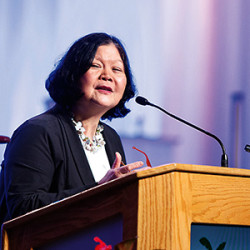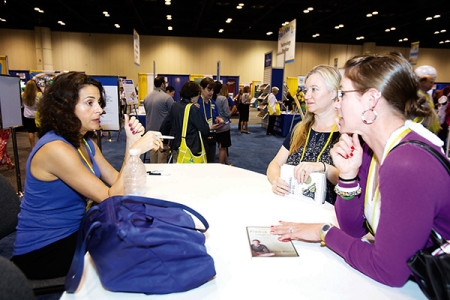
Carolyn Y. Woo, president and CEO of Catholic Relief Services, speaks about Catholic education to some 5,000 Catholic educators April 7. She delivered the opening keynote address of the annual convention of the National Catholic Educational Association at the Orange County Convention Center. (CNS photo/Tom Tracy)
By Tom Tracy
ORLANDO, Fla. (CNS) – The head of Catholic Relief Services made the case for Catholic education and Christian beliefs and values by retracing her own roots as a student of American missionaries in Asia through her higher education experiences as an international student in the U.S.
Speaking April 7 to some 5,000 Catholic educators in Orlando for the National Catholic Educational Association convention, Carolyn Woo, CEO and president of the U.S. bishops’ overseas and relief agency, recalled her early education in Hong Kong at a school run by the Maryknoll Sisters.
“The nuns taught us not to compete with each other but to help each other and to become friends,” she said. “Today, I am in almost daily contact with my colleagues from first grade, and so in my life I have been in many competitive contexts but never felt competitive with my peers.”
Woo recalled that as a young member of the Legion of Mary, she would volunteer to work with the poor in Hong Kong, and how the nuns provided them with rudimentary medical care. “I remember how difficult it was to bend down to wash, and touch and smell the feet of these individuals, but I also remember coming back from these service activities and asking, ‘Why them and why not me?’”
Today’s young people, she said, are not so much immoral as they are not given the adequate resources to “cultivate their moral intuitions, to think broadly about moral obligations and to have the tools to evaluate and navigate moral situations.”
She noted that one in five children live below the federal poverty line in families fraught with underemployment, homelessness, failed marriages, highly influenced by the popular media and advertising, violence, bullying, scams, child abuse, sexually transmitted disease and abandonment.
Born and raised in Hong Kong, Woo served on the CRS board of directors from 2004 until 2010 and traveled to observe the agency’s program in Africa and Asia, including Banda Aceh, Indonesia, soon after the Indian Ocean tsunami.
She immigrated to the United States to attend Purdue University in Indiana, where she received her bachelor’s, master’s and doctoral degrees. She held various positions at Purdue, ultimately serving as associate executive vice president for academic affairs.
Before becoming head of CRS in January 2012, she had been dean of the Mendoza College of Business at the University of Notre Dame since 1997. She was featured in the May/June 2013 issue of Foreign Policy magazine as one of the 500 “most powerful people on the planet” and one of 33 individuals in the magazine’s “force for good” category.
“In my work at CRS, I have come back full circle and now go to many places where there are no bathrooms and I understand what people have to live with,” said Woo, “and that came from the (Maryknoll) sisters, and from that the sisters helped us to define … what is the common ground in making friends with these people and about dignity of other people.”
Woo said Catholic education is so important because it places a high value on the real value of young people and on raising the next generation with Christian values.

Chicago-based bullying expert Jodee Blanco meets April 8 with participants at the National Catholic Educational Association’s annual convention, held this year in Orlando, Fla. Bullying was a popular workshop topic at the April 7-9 convention. (CNS photo /Tom Tracy)
“What happens through the many assemblies, retreats, lessons, catechism classes, youth groups, sporting events, extracurricular outings, confessions, the Eucharist, social actions projects, fundraisers, prayer circles, academic balls and so on? Clearly Catholic education is trying to teach students about Christ and Christianity and how this belief forms values and these values inform behavior,” she said.
The “mother of all questions” that Catholic education is transmitting to young people, Woo said, is: How real is God?
Young people have to see faith demonstrated through the actions of adults and church and parish life, Woo added, noting that she was a recipient of great hospitality as a foreign student at Purdue University and benefited from Catholic community support there.
Woo also recalled the value of stopping at chapel for a few minutes of quiet time as a student. That same true hospitality undergirds Catholic values everywhere, she said.
“It’s not just about academic rigor but all the different things that allow us to make God real in the lives of young people,” Woo said. “Think about the big questions that your students are asking at this point.”
“Our job is to help them and provide an environment for them to come to their own answers, where those answers are life-giving, that they don’t rule out possibilities and hope and joy on this earth,” she said, and show students not to give up ethics “thinking that in the end it is the strongest who survive and that it is OK to cheat so long as no one catches you, or to give up on marriage because of a father who walked out.”
(Copyright © 2014 Catholic News Service/United States Conference of Catholic Bishops. The CNS news services may not be published, broadcast, rewritten or otherwise distributed, including but not limited to, such means as framing or any other digital copying or distribution method in whole or in part, without prior written authority of Catholic News Service.)
(Editor’s note: The Diocese of Jackson sent several representatives to the NCEA conference. They will share what they learned with schools here.)



